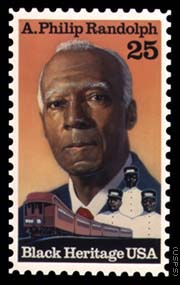A. Philip Randolph
|
|
Asa Philip Randolph (April 15, 1889 - May 16, 1979) was a socialist that was active in the labor movement and the US civil rights movement. He was born in Crescent City, Florida. His father was a minister of the A.M.E. Church who moved the family to Jacksonville, Florida in 1891. In 1911, Randolph moved to New York City’s Harlem in hope of becoming an actor.
Randolph’s parents objected to his dramatic aspirations, so while at the City College of New York, he switched his studies to politics and economics. While at City College, he met his future wife, Lucille Green. Green was a teacher who had quit that career when her first husband died and opened a lucrative beauty salon. After their marriage, Randolph’s political activities would often cause Lucille the loss of some customers.
Also at City College, Randolph met Chandler Owen, a sociology and political science student at Columbia University. Together, they formed the radical Harlem magazine, The Messenger, in 1917.
In 1925, Randolph organized the Brotherhood of Sleeping Car Porters. This was the first serious effort to form a labor union for the employees of the Pullman Company, which was a major employer of African-Americans. After years of bitter struggle, the Pullman Company finally began to negotiate with the Brotherhood in 1935, and agreed to a contract with them in 1937. The Brotherhood was associated with the American Federation of Labor.
Randolph emerged as one of the most visible spokespersons for African-American civil rights. In 1941, he, Bayard Rustin, and A. J. Muste proposed a March on Washington to protest racial discrimination in the armed forces. The March was cancelled after President Franklin D. Roosevelt issued the Fair Employment Act. Some militants felt betrayed by the cancellation because Roosevelt’s pronouncement only pertained to defense industries and not the armed forces themselves. In 1947, Randolph formed the Committee Against Jim Crow in Military Service, later renamed the League for Non-Violent Civil Disobedience. President Harry S. Truman abolished racial segregation in the armed forces through Executive Order 9981 on July 26, 1948. Randolph was also notable in his support (http://www.cis.org/articles/1999/back699.html) for restrictions on immigration.
Randolph also helped Rustin and Martin Luther King Jr. to organize the March on Washington for Jobs and Freedom on August 28, 1963.
Randolph's efforts on behalf of the Brotherhood of Sleeping Car Porters were portrayed in the Robert Townsend film "10,000 Black Men Named George". All the African-American workers in the Pullman company were addressed as "George" after George Pullman. A. Philip Randolph was also a member of Phi Beta Sigma Fraternity Inc.
External links
- Transcript, A. Philip Randolph Oral History Interview I, 10/29/69, by Thomas H. Baker, Internet Copy, LBJ Library. (http://www.lbjlib.utexas.edu/johnson/archives.hom/oralhistory.hom/RandolpA/randolp.asp) 26 pages. Accessed April 2, 2005.
- A. Philip Randolph Pullman Porter Museum (http://www.aphiliprandolphmuseum.com)
- A. Philp Randolf Institute (http://www.apri.org/) The Senior Constituency Group of the American Federation of Labor and Congress of Industrial Organizations (AFL-CIO)
Documentaries
- 10,000 Black Men Named George (http://www.imdb.com/title/tt0280377/) entry from the Internet Movie Database
- A. Philip Randolph Exhibit (http://www.georgemeany.org/archives/apr.html) at the George Meany Memorial Archives.
- A. Philip Randolph: For Jobs and Freedom (http://www.newsreel.org/nav/title.asp?tc=CN0001) 86 minutes, Producer: WETA. Director: Dante James. Distributor: California Newsreel. 1996.

